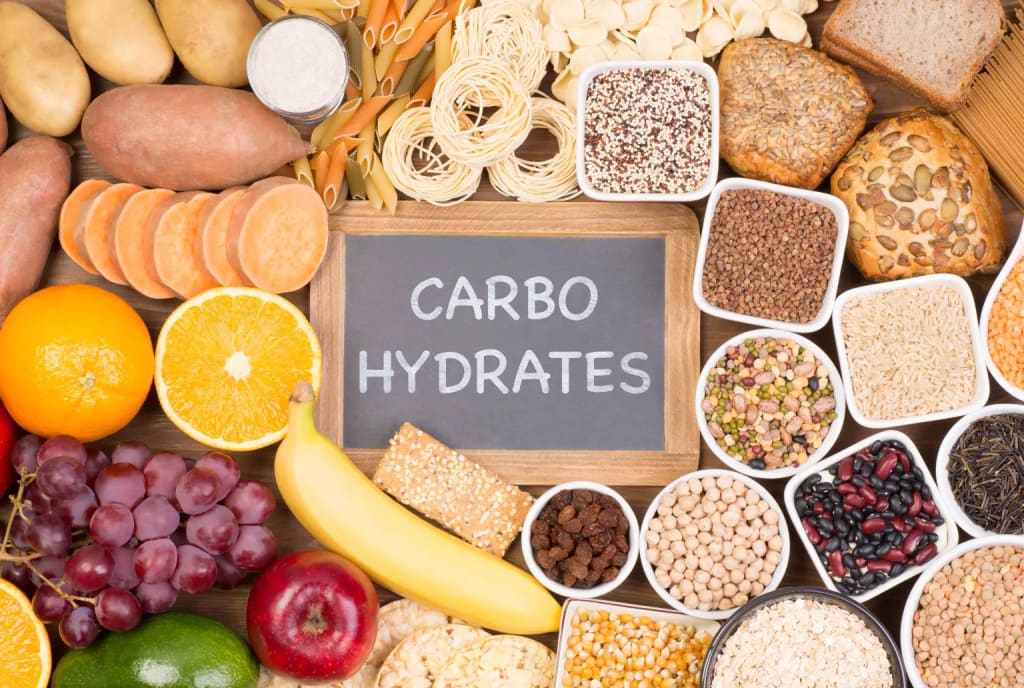Carbohydrates Monomer | All You Need to Know About Energy in Your Body
Know About energy in Your Body

Carbohydrates have a bad reputation, but not all carbohydrates are created equal. It’s important to understand the difference between good carbs and bad carbs so that you can make healthier choices for your diet. In this blog post, we will explore the differences between good carbs and bad carbs, as well as offer some helpful tips for choosing the right type of carbohydrates for your diet.
Table of Contents
- What are Carbohydrates?
- The Different Types of Carbohydrates:
- The Different Types of Carbohydrates
- Good Carbs vs Bad Carbs
- Carbohydrates in Human Body
- Healthy Carbohydrates for workout
- Carbohydrates Monomer
- The Bottom Line
What are Carbohydrates?
Carbohydrates are one of the main energy sources for our bodies. They are an essential part of a healthy diet and provide fuel for our brain and muscles. Carbohydrates are found in a variety of foods, from fruits, vegetables, grains, and dairy products to sweets and sugary drinks.
Carbohydrates can be divided into two categories: simple and complex. Simple carbohydrates are made up of one or two sugar molecules, while complex carbohydrates contain three or more sugar molecules linked together. Examples of simple carbohydrates include table sugar (sucrose), milk sugar (lactose), and fruit sugar (fructose). Complex carbohydrates are found in foods such as bread, pasta, potatoes, and rice.
The Different Types of Carbohydrates:
When it comes to carbohydrates, not all types are created equal. There are good carbs and bad carbs. Good carbs provide us with important nutrients such as fiber, vitamins, minerals, and antioxidants. Examples of good carbohydrates include whole grains, fruits, and vegetables. Bad carbs, on the other hand, are refined and processed foods that are stripped of their nutritional value. Examples of bad carbohydrates include white bread, white rice, and sugary snacks and drinks.
Good Carbs vs. Bad Carbs:
When it comes to selecting the right carbohydrates for your diet, it’s important to know the difference between good and bad carbs. Good carbs are digested slowly, releasing energy into your body over a longer period. They also help regulate blood sugar levels and provide your body with essential nutrients. Bad carbs are digested quickly and can cause spikes in blood sugar levels. Eating too many bad carbs can lead to weight gain and other health issues.
The Bottom Line:
When it comes to eating carbohydrates, it’s important to choose the right type for your body. Good carbohydrates provide essential nutrients that our bodies need while bad carbs can lead to unhealthy weight gain and spikes in blood sugar levels. By choosing the right carbohydrates, you can ensure that you’re getting the most out of your diet.
The Different Types of Carbohydrates
Carbohydrates are an essential nutrients for the body, and there are several different types. These include simple sugars, complex carbohydrates, and starches.
Simple Sugars: Simple sugars are the simplest form of carbohydrates and can be found in sweets and desserts. They provide a quick source of energy but don’t provide any other health benefits. Common examples of simple sugars include glucose, fructose, and sucrose.
Complex Carbohydrates: Complex carbohydrates are made up of long chains of sugars. They are a good source of energy and can help provide essential vitamins, minerals, and fiber. Examples of complex carbohydrates include fruits, vegetables, beans, grains, and legumes.
Starches: Starches are a type of complex carbohydrate composed of several glucose molecules. They take longer to break down and provide sustained energy throughout the day. Examples of starchy foods include potatoes, rice, bread, and pasta.
In addition to these three types of carbohydrates, there are also dietary fibers that are not technically considered carbohydrates but can still be beneficial for your health. Dietary fibers are found in plant-based foods such as fruits, vegetables, legumes, nuts, and whole grains.
Good Carbs vs Bad Carbs
When it comes to understanding carbohydrates, the most important thing to remember is that not all carbs are created equal. There are good carbs, which provide essential vitamins and minerals and help keep you feeling full and energized, and then there are bad carbs, which can be nutritionally empty and can lead to weight gain and other health problems.
Good carbohydrates come in the form of whole grains, fruits, vegetables, legumes, nuts, seeds, and dairy products. These types of carbs are rich in fiber, vitamins, minerals, antioxidants, and other essential nutrients that help promote good health. Whole grains provide important B-vitamins and minerals like iron, magnesium, and selenium, as well as fiber. Fruits and vegetables contain a wide range of vitamins, minerals, and phytochemicals that can protect against disease. Legumes provide important protein, vitamins, and minerals as well as fiber. Nuts and seeds are packed with healthy fats, vitamins, minerals, and fiber. Dairy products provide calcium, phosphorus, and other important vitamins and minerals.
On the other hand, bad carbohydrates come from processed or refined foods such as white breads, pastries, cookies, cakes, chips, candy bars, sodas, and many snack foods. These foods contain little to no nutritional value and can lead to weight gain, elevated blood sugar levels, and other health issues. Refined carbohydrates have been stripped of their natural fiber content, which helps slow digestion and keeps you feeling fuller for longer.
The Bottom Line:
It’s important to be mindful of the types of carbohydrates you consume. Eating more whole grains, fruits, vegetables, legumes, nuts, seeds, and dairy products can help keep you feeling full and energized while reducing your risk of chronic diseases. Avoiding processed or refined carbs can help you maintain a healthy weight and keep your blood sugar levels in check.
Carbohydrates in Human Body
Carbohydrates are one of the most important nutrients for our bodies and play a vital role in many biological processes. They are the main source of energy for our cells and organs, providing us with the fuel we need to stay active and healthy.
Carbohydrates are broken down in our bodies into glucose, which is then used as energy by cells and organs. Glucose is also necessary for proper brain functioning, as it helps to regulate our mood and cognitive processes. Without enough carbohydrates, we can experience feelings of fatigue, irritability, and poor concentration.
There are two main types of carbohydrates: simple carbs and complex carbs. Simple carbohydrates, such as sugar, are quickly absorbed and provide a quick burst of energy. Complex carbohydrates, such as starchy vegetables, take longer to digest and provide a more sustained energy release over time.
When it comes to carbohydrates, the key is to choose healthy sources that contain a balance of both simple and complex carbs. Eating a variety of whole grains, fruits, vegetables, legumes, and nuts will help ensure that your body is receiving all the essential nutrients it needs.
It’s also important to note that consuming too many carbohydrates can lead to weight gain, so it’s important to maintain a balanced diet. Eating healthy carbohydrates in moderation will help you maintain your energy levels and keep your body functioning optimally.
Healthy Carbohydrates for workout
Carbohydrates play an important role in a successful exercise routine. Not only do they provide energy for your body, but they also help with recovery and muscle growth. It’s important to get the right type of carbohydrates to fuel your workout.
The best carbs to eat before and after a workout are those that are low in sugar and high in fiber, such as whole grains, legumes, fruits, and vegetables. Eating a variety of these types of carbohydrates can help fuel your workout and promote recovery.
Before a workout, it’s important to have some carbs on board to give you energy for the activity. Whole-grain toast with peanut butter, a banana, or oatmeal are all good choices. These foods are slowly digested, so they will provide sustained energy for your workout.
After a workout, it’s important to replace the energy used during your exercise. Eating carbs such as quinoa, brown rice, sweet potatoes, or whole-grain bread can help replenish your glycogen stores and help your body repair itself.
It’s also important to consume some protein along with the carbs post-workout. Protein helps build and repair muscle tissue, so eating lean proteins such as chicken, eggs, fish, beans, and tofu can help maximize your recovery.
By eating healthy carbohydrates before and after a workout, you can ensure that you are getting the energy and nutrients you need for maximum performance and recovery.
Carbohydrates Monomer
Carbohydrates are an important group of molecules composed of carbon, hydrogen, and oxygen atoms. Monosaccharides are the simplest form of carbohydrates and are known as the ‘building blocks for more complex carbohydrates. These monomers are single molecules that contain either three, four or five carbons. The three most common monosaccharides are glucose, fructose and galactose. Glucose is the main energy source for the human body, and it is found in fruits, vegetables and grains. Fructose is a natural sugar found in fruits, while galactose is found in dairy products.
These monosaccharides can be further combined to form disaccharides and polysaccharides. Disaccharides consist of two monosaccharides joined together by a chemical bond, such as sucrose, maltose and lactose. Polysaccharides are larger carbohydrate molecules composed of many monosaccharide units linked together. Common polysaccharides include starch, cellulose and glycogen. Starch is found in foods like potatoes, rice, and pasta, while cellulose is an indigestible fiber found in plant cell walls. Glycogen is a stored form of glucose in humans and other animals that serves as an energy source during intense physical activity.
In summary, carbohydrates are complex molecules composed of monosaccharides that form disaccharides and polysaccharides. These molecules play a vital role in providing energy for the human body and should be consumed in moderation for optimal health.
The Bottom Line
When it comes to carbohydrates, not all carbs are created equal. Choosing healthy carbs can be an important part of a healthy diet. Eating foods high in fiber, such as fruits, vegetables, and whole grains, and limiting your intake of refined carbohydrates and sugars can help you meet your nutritional goals. Furthermore, it’s important to include a variety of carbohydrates in your diet to ensure you’re getting the vitamins and minerals your body needs. Eating a balanced diet that is rich in all food groups will help you stay healthy and energized.
Click here to learn more about healthy carbs from nutrition specialist.
Click here to learn more about healthy eating





Comments
There are no comments for this story
Be the first to respond and start the conversation.